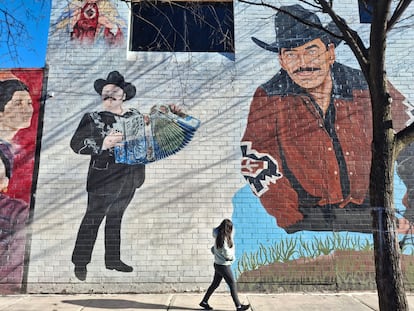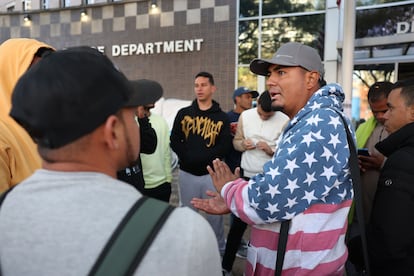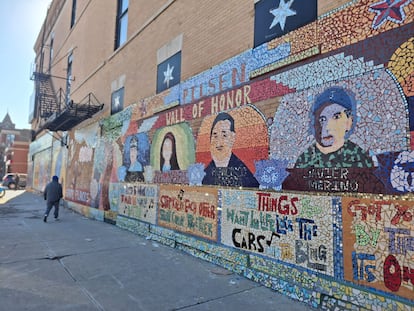Latinos hold their breath before the return of Donald Trump: “We are afraid”

Quinceañera dresses, mariachi costumes, figures of the baby Jesus, piñatas, tortillas and grupera music. It is not a market in the interior of Mexico, although it could be. He discount mall Little Village is a nostalgia economy mecca for Chicago’s Mexican community, the city’s largest minority. Lately, however, many businesses have been in the doldrums. “People are hardly going out anymore,” explains Silvia, the clerk at a cowboy hat and boot store. Faced with the threat of mass deportations, raids and Donald Trump’s war on sanctuary cities, sales have fallen, mall hallways have been filled with uncertainty and there have been incidents of people entering hurling expletives and insults at migrants. . “We are afraid, no one knows what is going to happen,” admits the 37-year-old saleswoman, who has spent more than half of her life without papers, working in the other side.
Trump’s return has put 1.8 million Latinos residing in the Chicago metropolitan area, the third largest in the country, on alert, including a fifth who do not have documents, according to official estimates. “We are worried that the migrate”says María, another Mexican saleswoman, 56 years old, a couple of stores later. She has also noticed the change since the November elections and the anxiety that predominates days before the tycoon takes office on January 20. “We are going to continue working, there is no other option; If they catch me, I will fight the case and defend my rights,” he says.
The strong-arm discourse has permeated among the city’s migrants and many have chosen to lower their profile or resign themselves to whatever comes. “If I have to stay here or be returned, it will be God’s decision,” says a Guatemalan immigrant, visibly uncomfortable when asked about politics. “My opinion is not that important,” says a Mexican lady to avoid getting into trouble.
The Republican Party has put Chicago’s vocation in favor of migrants in its sights. Texas Gov. Greg Abbott sent thousands of refugees and asylum seekers by land and air to the city, which has absorbed nearly 52,000 new arrivals in the past two years, mainly Venezuelans. Added to them are those who arrive on their own and have not entered the official records.

In the midst of the political clash, Mayor Brandon Johnson has recognized that the authorities can no longer guarantee a bed for everyone who comes and has limited the reception system due to the lack of resources, although he has also said that he will remain firm in the defense of migration, rooted in the history and identity of the city. Although Chicago is a stronghold of Democrats, the authorities have been the target of questions, due to the notion that the economy is not improving and that the immigration crisis consumes too many resources. “It seems good to me that we are in solidarity, but for years there have been people who have lived under the bridges and no one supports them,” says Puerto Rican Reina Marcelle, 53 years old.
The political clash over migration is not new. Chicago has been under the siege of Trumpism for years. Tom Homan, the next border czar, announced in December that mass deportations will begin here. Before, during Trump’s first presidency, La Villita (also called Little Village) endured four years of constant threats of raids against migrants. “Since last time, the man talked a lot, let’s see what he does,” says Silvia.
“Half of my family is still undocumented and I understand the fear there is,” says Democratic Congresswoman Delia Ramírez, the first Latina to represent Illinois in the House. “It is very important that people understand that Trump’s threats not only affect immigrants, but also impact the economy, education, even the security and development of the country,” adds the legislator of Guatemalan origin. Ramírez assures that Homan’s statements must be taken seriously, but calls for the opposition and organizations to increase pressure to make it clear that anti-immigrant policies will have a cost and cannot be applied without resistance.
“The great battle of the next four years will be fought in the courts,” says José Luis Gutiérrez, founder of the Alianza Américas network and director of the Casa Michoacán community center in DuPage. Gutiérrez assures that a coalition of organizations has been preparing for months to face the challenge and that there is an increasing demand for legal advice and training to react to arbitrary detentions.

The Mexican Government is preparing a consular protection strategy, while associations are preparing protests and closely monitoring changes in legislation that could facilitate the expulsion of members of the community. They have also launched themselves to dispute the narrative terrain and xenophobia so that other ethnic groups join as allies. “The most effective way to combat Trump’s verbal terrorism is for people to know their rights,” says Gutiérrez. “The biggest fear is deportations, but it won’t be easy for them to happen if we organize.”
In the neighboring neighborhood of Pilsen there were still up to sixty signs in businesses that read “Dogs and Mexicans are prohibited (No dogs or mexicans allowed)”. Today it has become a symbol of the Mexican-American community, filled with enormous murals of María Félix, Pedro Infante and Aztec warriors; solemn tributes to the struggles of leaders and activists, and thriving businesses that proudly display their Mexican heritage. “Families are struggling, there is no work and there is no money, the outlook looks quite complicated with this president,” notes artist Eufemio Pulido, who has lived in the area for 45 years and a Kamala Harris voter.
Óscar, who has his tamale stand in front of the Tenochtitlán square in Pilsen, hopes that with Trump the economy will improve. “He knows how to handle money,” says the 60-year-old man. The Republican’s speech has also permeated among many members of the Latino community, suffocated by economic pressures and the notion that the Democrats benefited other groups, such as Ukrainians and Venezuelans, and gave them nothing. “They live like kings and we pay for it with our taxes,” the seller complains.
“This Government has created many parasites,” says Rosendo Sánchez, a Mexican who voted for Trump for the economy and the defense of traditional values. “I don’t vote for the party, if the Democrats had a politician like Trump I would vote for them,” he adds. Antonio Soto, who asks not to use his real name, assures that the country needs a “strong hand” to right itself and defends the effectiveness of the Republicans against the “empty promises” of the Democrats. “He is not going to mess with the Mexicans who work and it does not offend me (when he speaks badly of Latinos) because I am not a murderer or a thug, we need someone to defend us,” he explains.
Like him, many Latinos are reluctant to openly say who they voted for, but the results speak for themselves. In areas of Little Village, support for Trump went from 13% in 2020 to 32% in 2024, according to the newspaper Chicago Tribune. At the national level, the Republican took around 45% of the Latino vote, according to US media.

“It is always assumed that Latinos are going to vote for Democrats, why?” questions Xóchitl Bada, an academic at the University of Illinois. “It is almost never taken into account that Latinos are concerned about the same things as others,” he adds. The researcher affirms that there are no easy explanations to understand the results, but points out that the elections did show that Hispanics are increasingly diverse and generalizations are no longer useful.
Trump has not taken office, but his effects are already visible. Some employers fear being inspected and have fired undocumented people, who often do the hardest and lowest-paying jobs. Many migrants struggle to find other jobs and entire families begin to think about what’s next. “If things get complicated, we will leave,” says Kimberly, an 18-year-old Venezuelan student, near Humboldt Park, one of the epicenters of the migration crisis in the city.
Amid extreme winter temperatures and the closure of migrant-only shelters, a race against time has begun for many newcomers to find work and housing. “We are worried, but if it is not here, it will be Canada or another State, returning to Venezuela is not an option,” says Elías José, 21 years old, who arrived in the city a week ago. Anxiety has caused a contagion effect in other nationalities. “You have to carry the paperwork, you don’t want to be collateral damage,” says Mexican Alberto Hernández, 45 years old.
Despite the uncertainty, there are also reasons for hope. “Unlike Los Angeles or New York, we countrymen here are more empowered and have more and more weight,” says Gutiérrez. Bada is confident that Latinos occupy more and more decision-making positions and have organized for decades to face what is coming. “If you stay silent and fear wins, the abuse will only increase,” he says. “We will do everything possible so that Trump cannot carry out his threats,” says Congresswoman Ramírez, part of a new generation of politicians called to lead the resistance and regain the trust of the majority.




